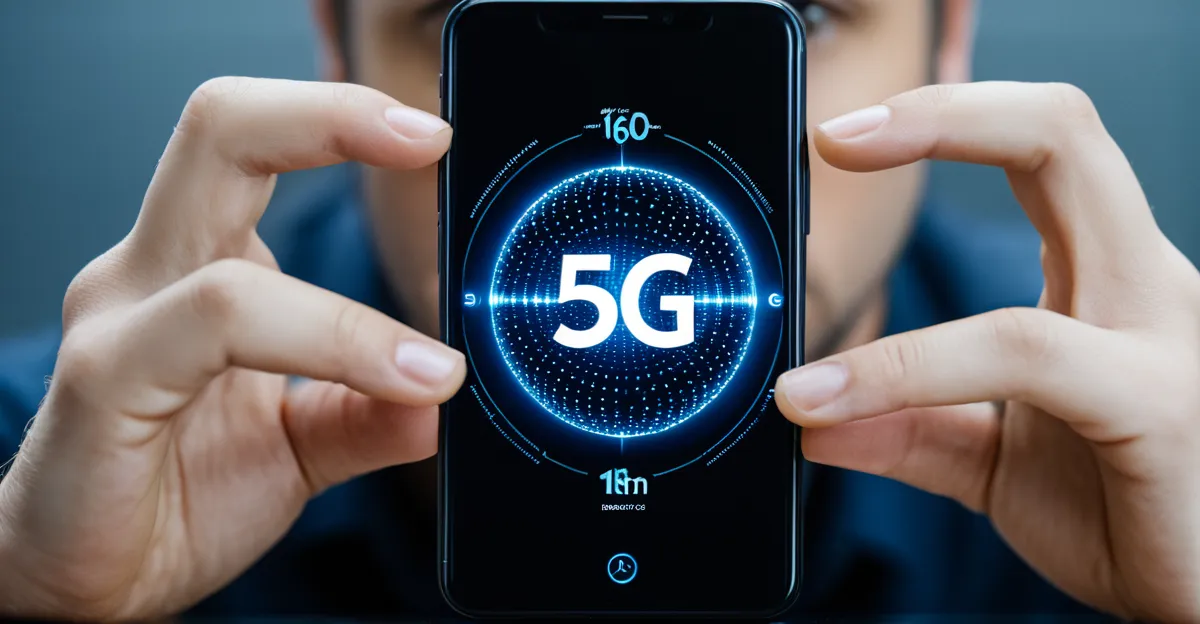5G technology and its impact on UK digital infrastructure
5G technology in the UK represents a significant leap forward from previous generations, offering faster data speeds, lower latency, and improved network capacity. Unlike 4G, 5G allows for near-instantaneous communication, which enables real-time applications and supports the growing demand for connected devices.
The expansion of 5G networks across the UK has accelerated steadily, with increasing coverage in urban centers and ongoing efforts to extend service to rural areas. This wider availability enhances the overall digital infrastructure, ensuring more consistent and reliable connectivity for both consumers and businesses.
Also to discover : Essential it support services for harlow businesses
5G forms the backbone of evolving UK computing services by facilitating advanced applications such as cloud computing, Internet of Things (IoT), and smart city initiatives. Its enhanced network capabilities empower these services to operate efficiently, driving innovation and transforming how digital solutions are delivered throughout the country.
Enhancements in speed, latency, and scalability for UK computing
In the UK, 5G benefits are transforming computing by dramatically increasing network speed. Enhanced data transfer rates enable both businesses and consumers to access and process large volumes of data with greater efficiency. This surge in speed is essential for applications demanding rapid responsiveness, from cloud computing to streaming services.
Also to read : Revamp your online store with woocommerce fulfilment solutions
Low latency is another crucial advantage. The decrease in delay times allows for real-time processing improvements, which are vital for sectors such as healthcare, autonomous vehicles, and financial trading. Reduced latency ensures that commands and data exchange occur almost instantaneously, creating seamless user experiences and boosting operational effectiveness.
Scalability of infrastructure and services has also improved significantly with the integration of 5G technology. Businesses can now expand their computing capabilities dynamically without compromising performance. This flexibility supports diverse needs, from startups requiring modest resources to large enterprises managing extensive data ecosystems.
Taken together, these enhancements in network speed, low latency, and scalability are driving a new wave of innovation in UK computing, enabling faster, more reliable, and adaptable solutions than ever before.
Transformation in cloud computing and data centers
The advent of 5G UK cloud computing is revolutionizing how data centers operate and deliver services. With 5G connectivity, cloud-based platforms now enjoy significantly improved access speeds and reduced latency. This means users in the UK can interact with cloud applications faster and more seamlessly than ever before.
On the data center side, 5G plays a pivotal role in enhancing their performance. The ultra-low latency and increased bandwidth that 5G networks provide allow data centers to manage traffic more efficiently and support the rising demand for real-time processing. Consequently, data centers evolve to handle high-bandwidth applications, such as streaming, immersive virtual reality, and complex analytics, which were previously limited by slower network connections.
Furthermore, 5G enhances the ability of data centers to support remote services and distributed cloud environments. This is critical for businesses looking to decentralize their infrastructure, ensuring consistent performance regardless of geographical location.
In summary, the integration of 5G UK cloud computing with modern data centers ushers in a new era of speed, reliability, and flexibility, fundamentally changing how cloud resources are accessed and managed.
5G-driven advancements in IoT and smart technology
The arrival of 5G IoT UK networks is transforming the landscape of smart technology by enabling a massive increase in the number of connected devices. Unlike previous generations, 5G offers ultra-low latency and high bandwidth, allowing thousands of IoT devices to communicate simultaneously with minimal delay. This capability is vital for urban environments and industries aiming to harness the full potential of connected devices.
In smart cities, 5G empowers infrastructure to operate seamlessly. Traffic lights, environmental sensors, and public safety systems can exchange real-time data, improving efficiency and quality of life. Healthcare benefits significantly as remote monitoring devices and telemedicine solutions leverage 5G’s capacity to transmit large volumes of data instantly and securely. In transportation, 5G supports vehicle-to-everything (V2X) communication, enabling autonomous vehicles and smart public transport systems to react promptly to changing conditions.
Beyond connectivity, 5G enhances real-time data analytics and automation possibilities. With faster data transfer, AI and machine learning algorithms can process information from connected devices on the fly, enabling predictive maintenance in manufacturing or personalized services in retail. The combination of 5G IoT UK networks and advanced smart technology is thus paving the way for innovative solutions that were previously impractical due to latency and bandwidth constraints.
Growth of edge computing and its applications
Edge computing has become a pivotal development, especially with the rise of 5G edge computing UK initiatives. By bringing distributed computing resources closer to end-users, it minimizes the distance data must travel. This proximity leads to significant latency reduction, making real-time processing more feasible.
A prime advantage of edge computing lies in its support for local processing. Instead of sending data to centralized cloud servers, computations occur near the data source—be it a smartphone, sensor, or vehicle. This approach not only reduces network congestion but also enhances data security and privacy.
Several key applications illustrate the impact of edge computing. In the realm of autonomous vehicles, real-time decision-making is critical; edge computing enables these systems to process sensor data instantly, improving safety and responsiveness. Industrial automation benefits likewise, as machinery can be monitored and adjusted on-site without delays. Additionally, real-time monitoring in healthcare and smart cities depends on rapid local data analysis to function effectively.
Overall, by reducing data travel and increasing operational efficiency, edge computing complements the deployment of 5G edge computing UK networks and propels forward cutting-edge technologies reliant on immediate data processing.
Industry case studies: UK businesses leveraging 5G
5G use cases in the UK are increasingly transforming key industries by unlocking new levels of computing innovation and operational efficiency. UK businesses have embraced 5G technology rapidly, tailoring it to their unique demands and challenges.
In financial services, 5G’s ultra-low latency and high reliability enhance transaction processing speed and accuracy. Banks and trading firms benefit from near-instantaneous data transfers, enabling faster trade executions and fraud detection. This adoption addresses the pressure for real-time financial operations and security.
The healthcare sector leverages 5G for advanced telemedicine and remote patient monitoring. With greater bandwidth and stable connections, medical professionals deliver consultations and diagnostics remotely, improving patient access and outcomes. This development supports continuous care and reduces strain on traditional facilities.
Manufacturing and logistics companies utilize 5G to drive automation and optimize supply chains. Real-time equipment monitoring and autonomous vehicles rely on consistent connectivity to improve productivity and reduce downtime. By integrating 5G-driven IoT devices, manufacturers enhance operational visibility and responsiveness.
These UK industry examples illustrate how 5G use cases are not simply about faster connections but about enabling computing innovation that reshapes business models and service delivery.
Challenges and considerations for widespread 5G adoption
The road to widespread 5G adoption faces significant hurdles, especially when considering the UK’s unique landscape. One major challenge is the infrastructure roll-out, which suffers from regional disparities. Urban areas typically receive faster upgrades, while rural regions lag behind due to higher costs and logistical difficulties. This uneven deployment slows the overall progress and limits the benefits that 5G could deliver to the entire population.
Security and privacy concerns present another barrier to 5G adoption. The increased number of connected devices and enhanced data transmission speeds expand potential vulnerabilities, making cybersecurity a critical focus. Network providers and regulators must implement robust safeguards to protect sensitive information against increasingly sophisticated cyber threats. Without addressing these concerns transparently, consumer trust could wane, further hindering adoption rates.
Alongside infrastructure and security, a notable skills gap affects the UK’s ability to fully embrace 5G technologies. Specialized expertise is essential for deploying, maintaining, and optimizing 5G networks, yet there remains a shortage of qualified professionals. Investing in training and education programs is crucial to equip the workforce with the necessary capabilities and support sustained growth in this sector.
In summary, overcoming the 5G challenges UK encounters requires addressing infrastructure inequalities, strengthening cybersecurity measures, and bridging the skills gap through targeted investment. These steps will pave the way for more equitable and secure 5G adoption across the country.
Future outlook for 5G in UK computing services
The 5G UK future trends point toward a transformative era in computing services, driven by faster connectivity and lower latency. As 5G networks become more widespread, they will significantly accelerate the evolution of computing services, enabling real-time data processing and more efficient cloud integration. This evolution is expected to support emerging technologies such as AI and machine learning, which rely heavily on swift and stable data transfer to optimize algorithms and predictive analytics.
Integration of 5G with quantum computing represents another promising development. While quantum computing is still nascent, 5G’s enhanced bandwidth and reliability can facilitate the necessary infrastructure for quantum applications to interface with conventional systems seamlessly. This synergy will vastly expand computing capacities and introduce new paradigms in data security and processing speed.
Additionally, these technological advancements are set to pave the way for entirely new industries and services in the UK. Areas like autonomous transport, smart healthcare, and immersive entertainment will benefit from 5G-enabled low-latency connections. This potential marks a crucial shift, positioning the UK as a competitive leader in deploying these futuristic computing services.











